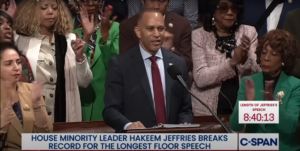It is common knowledge, and unacceptable, that kids can access explicit material on Instagram, TikTok, and the other mainstream social media apps. But they are also being exposed to adult content through a variety of other lesser known, completely unregulated apps pushed to them through app stores. That’s why Sen. Mike Lee (R-Utah) and Rep. John James (R-Michigan 10th) have introduced the App Store Accountability Act.
How to regulate the dark side of social media apps without trampling free speech has been one of the hottest conversations in D.C. the past few years. Pornography is the most corrosive epidemic of the modern age, and that’s in large part due to how easy it is to access via social media. A study out of London from Middlesex University that comprised kids ages 11 to 16 discovered that 28% of respondents were first exposed to porn by accident. Another 19% were unexpectedly shown it by someone else.
While porn is not healthy for anyone, it is particularly harmful to young people whose brains are not fully developed. That same study revealed that because kids are unable to process explicit content in the same way as adults, exposure to it at a young age creates unhealthy neural pathways and sets them up to be lifelong addicts. To stop the societal rot that is the porn industry and to help protect the vulnerable kids who are victims of it, something must be done about just how easy it is to access adult content online.
Several bipartisan bills that Concerned Women for America Legislative Action Committee has endorsed have been introduced to that effect. The Kids Online Safety Act (KOSA) would put important guardrails on social media sites to make them more child friendly. The EARN IT Act would amend section 230 by removing blanket immunity from big tech companies, making them liable for harm done to minors via one of their platforms. And the SCREEN Act would require pornographic websites to implement some kind of age verification technology to ensure children are not accessing such harmful content.
The App Store Accountability Act is the latest attempt to do that. Like the SCREEN Act, it seeks to implement an age verification system. But rather than just on one particular type of website or app, it would do so for all app stores, such as the Apple App Store and Google Play, to name a couple. This would protect kids from accessing corrosive material from not just the typical big-name social media culprits but also the smaller apps that are not on anyone’s radar that profit heavily from getting adult content in front of kids and can be downloaded from app stores.
Perhaps more important than the age verification piece, in terms of enforcement, the bill would grant a private right of action for parents and guardians, allowing them to sue app stores if their children are exposed to pornographic content or extreme violence through them. If these app stores no longer have liability protection, they will be incentivized to enforce age verification and parental controls to ensure that kids are not able to access harmful online material. As Sen. Lee said in his statement on the bill’s introduction, “If we want to stop this vicious trend, we can’t rely on big corporations to be ‘moral.’ We need them to know they’ll go bankrupt if they victimize kids.”
I am proud to introduce S.5364, the App Store Accountability Act, to keep kids safe from exploitation online.
Too many companies profit from adult content reaching children, and it’s going to stop.
First, this bill creates a private right of action for parents and guardians…
— Mike Lee (@SenMikeLee) November 26, 2024
Big tech will likely lobby hard against this bill, but exposing innocent children to graphic adult content is not a matter of free speech – it’s permanently damaging to the kids. If there’s one thing Congress should agree on, it’s that they have a duty to protect the most vulnerable from those looking to profit from their harm. We’re grateful to Sen. Lee and Rep. James for being champions on this.
Use our action center to tell your Senators and Representative to support the App Store Accountability Act.





